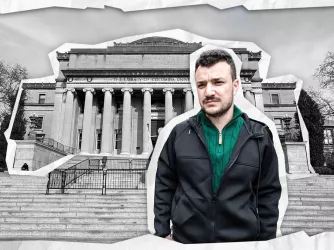Table of Contents
Trump v. Merchan — Testing the limits of judicial contempt in criminal cases: 12 questions . . . and a just-released appellate ruling — First Amendment News 423
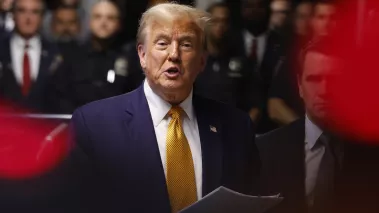
Michael M. Santiago / Pool via USA TODAY NETWORK
Former U.S. President Donald Trump gives end of the day remarks after exiting the courtroom during his hush money trial at Manhattan Criminal Court on May 14, 2024 in New York City.
The dominance of the State over an individual is near its apex when it invokes its criminal prosecution powers. That is one reason why due process of law is so important in such cases. But what of the First Amendment rights of the criminally accused to respond boldly when his or her liberty is on the line?
It is one thing to allow the press a high degree of freedom when it comments on pending criminal cases — see, for example, Bridges v. California (1941, 5-4 vote). But what if the person, unlike the parties in Bridges, is neither a press person nor an outsider publicly commenting on a pending case? What if the one claiming an uninhibited First Amendment right in a pending case is the criminally accused?
Now consider this matter in light of the dynamic between former President Donald Trump and Judge Juan Merchan in the current hush money case, New York v. Trump. This case raises a basic question: What are the outer limits of contempt regarding a defendant in a criminal case?
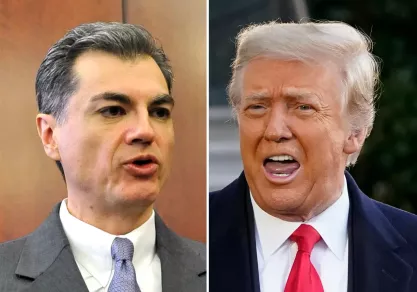
Consider, for example, the following questions:
- Can one say anything about the presiding judge or prosecutor?
- What about those who testify against such a defendant?
- How much leeway should be allowed when making comments outside the courtroom?
- What if someone testifying against the defendant takes to the airwaves and condemns him while the trial is pending?
- Can the defendant respond in kind to the press?
- Should whatever leeway allowed when criticizing a judge extend to attacks on her law clerks or family?
- What about such attacks on the prosecutor’s family and staff?
- When considering such questions, how does the fame or notoriety of the defendant factor in? That is, does it matter that such a defendant’s power to summon up hostile responses is real and even likely?
- In enforcing a judicial contempt citation against a criminal defendant, how substantial can a monetary penalty be? What if the defendant can readily pay such a fine and is not dissuaded by it?
- What are the limits of enforcing judicial contempt when deciding to incarcerate a defendant in a criminal case?
- Can such incarceration occur during the trial itself?
- And how exactly does the First Amendment play out in such situations? How is it to be balanced against concerns related to the administration of justice? What test or tests apply in such cases? (Note that the text of the First Amendment refers only to “Congress” and not the judicial branch. Does that matter?)
Related
- Max Radin, “Freedom of Speech and Contempt of Court,” Illinois Law Review (1942)
Trump gag order appeal rejected
- Dylan Stableford, “Trump trial updates: Michael Cohen faces cross-examination on 2nd day of testimony,” Yahoo! News (May 15)
[Yesterday, a] New York appeals court has denied Trump's request to end the gag order that was imposed on him in the ongoing hush money case. “We find that Justice Merchan properly weighed petitioner’s First Amendment Rights against the court’s historical commitment to ensuring the fair administration of justice in criminal cases, and the right of persons related or tangentially related to the criminal proceedings from being free from threats, intimidation, harassment, and harm,” the court wrote. Judge Juan Merchan has held Trump in contempt 10 times for violating the gag order. Trump has called the order against him unconstitutional.
- In the Matter of Donald J. Trump v. Merchan, et al. (May 14, 2024)
Before: Singh, J.P., Kennedy, Rodriguez, Pitt-Burke, Michael, JJ.
[. . .]
Petitioner brings this petition because he disagrees with where the circuit court drew the line in balancing the competing considerations of his First Amendment rights to free expression and the effective functioning of the judicial, prosecutorial and defense processes (id. at 1027-1028, citing Landmark Communications v. Virginia, 435 US 829 [1978]). Weighing these concerns, the circuit court ultimately concluded that, given the record, the court had “a duty to act proactively to prevent the creation of an atmosphere of fear or intimidation aimed at preventing trial participants and staff from performing their functions within the trial process” (Trump, 88 F4th at 1014). This Court adopts the reasoning in the circuit court’s Federal Restraining Order Decision.
The Federal Restraining Order Decision properly found that the order was necessary under the circumstances, holding that “Trump’s documented pattern of speech and its demonstrated real-time, real-world consequences pose a significant and imminent threat to the functioning of the criminal trial process” (id. at 1012). First, the circuit court concluded that petitioner’s directed statements at potential witnesses concerning their participation in the criminal proceeding posed a significant and imminent threat to their willingness to participate fully and candidly, and that courts have a duty to shield witnesses from influences that could affect their testimony and undermine the integrity of the trial process (id.; see also Sheppard v Maxwell, 384 US 333, 359 [1966]). Justice Merchan properly determined that petitioner’s public statements posed a significant threat to the integrity of the testimony of witnesses and potential witnesses in this case as well.
The constitutional objections that petitioner lodges against the Restraining Order’s restrictions on his statements relating to Mr. Colangelo and Ms. Merchan are unavailing. Notably, petitioner does not argue that the Restraining Order has impinged upon his Sixth Amendment rights, or that he is unable to receive a fair trial because of the Restraining Order. Instead, he argues that the restriction of his statements relating to any real or perceived impropriety posed by Mr. Colangelo’s and Ms. Merchan’s actions and employment history restrict his ability to engage in protected political speech and may have some adverse impact on his campaign. We find that Justice Merchan properly weighed petitioner’s First Amendment Rights against the court’s historical commitment to ensuring the fair administration of justice in criminal cases, and the right of persons related or tangentially related to the criminal proceedings from being free from threats, intimidation, harassment, and harm.
Giuliani’s daily radio show canceled over false 2020 election claims
- “WABC Radio Suspends Rudy Giuliani for Discussing Discredited 2020 Election Claims,” First Amendment Watch (May 13)
Rudy Giuliani was suspended Friday from WABC Radio and his daily show was canceled over what the station called his repeated violation of a ban on discussing discredited 2020 election claims. Giuliani said the station’s ban is overly broad and “a clear violation of free speech.”
Giuliani issued a statement saying he had heard of WABC Radio owner John Catsimatidis’ decision through “a leak” to The New York Times. Catsimatidis confirmed his decision in a text message to The Associated Press.
Giuliani “left me no option,” Catsimatidis told the Times, saying that the former New York City mayor had been warned twice not to discuss “fallacies of the November 2020 election.”
“And I get a text from him last night, and I get a text from him this morning that he refuses not to talk about it,” the Republican businessman, who has fundraised for Donald Trump, told the newspaper.
Ohio protesters in masks warned of possible prosecution under anti-KKK law

- “Ohio AG warns student protesters in masks could face felony charges under anti-KKK law,” PBS (May 13)
Ohio’s top lawyer has advised the state’s public universities that a law written to deter Ku Klux Klan demonstrations could be used to impose felony charges on students who wear face coverings while protesting the war in Gaza.
In a letter sent Monday, after weeks of pro-Palestinian campus protests around the country, Republican Attorney General Dave Yost advised the presidents of Ohio’s 14 public, four-year universities — which his office represents — to forewarn students about the 1953 law.
“In our society, there are few more significant career-wreckers than a felony charge,” the letter said. “I write to you today to inform your student bodies of an Ohio law that, in the context of some behavior during the recent pro-Palestinian protests, could have that effect.”
The law is contained in a single sentence: “No person shall unite with two or more others to commit a misdemeanor while wearing white caps, masks, or other disguise.” Violating this “anti-disguise” law is punishable by a fourth-degree felony charge, up to $5,000 in fines and five years on community control, Yost wrote.
Related
- Robert A. Kahn, “Anti-Mask Laws,” Free Speech Center (July 31, 2023)
Around 15 states have anti-mask laws, as do many counties and municipalities. Most anti-mask laws do not target specific groups explicitly. Instead, they use neutral language, typically banning mask-wearing that intimidates others. Supporters of such laws argue that wearing masks emboldens people to commit crimes and makes those crimes more frightening to the victims.
Opponents, in turn, make three arguments. First, they invoke freedom of association, claiming that mask laws deprive wearers of the anonymity needed to express their views.
[. . .]
Second, opponents of anti-mask laws argued, largely unsuccessfully, that masks constitute symbolic speech.
[. . .]
Third, opponents contended that most anti-mask laws violate the equal protection clause because they make exceptions for Halloween masks, masquerade ball masks, and masks worn for medical reasons, but not masks for political acts.
First Amendment Watch interview with civil rights attorney Mike Laux
- Susanna Granieri, “Attorney Mike Laux on Challenging the ‘Indoctrination’ Provision in Arkansas,” First Amendment Watch (May 14)
In 1957, Little Rock Central High School in Arkansas made headlines for the contentious integration of the Little Rock Nine following the 1954 Supreme Court decision in Brown v. Board of Education. In 2024, Central High School is, once again, at the center of a civil rights dispute.
In April, two Central High School teachers, two students and their parents, and the state’s NAACP chapter filed a lawsuit challenging a section of the recently enacted LEARNS Act, an education bill signed by Republican Gov. Sarah Huckabee Sanders last year. The lawsuit challenges a provision of the law that effectively removes credit from the Advanced Placement (AP) African American Studies course and bars, among other things, teachings “that would indoctrinate students with ideologies” like Critical Race Theory (CRT).
CRT is a field of study that focuses on systemic racism in America’s history and how laws and institutions have enhanced the power struggle between white and Black people. But its critics claim that the focus on white supremacy and the history of racism creates a harmful narrative that makes white students feel guilty. The bill follows a pattern of other measures from Republican lawmakers in state legislatures seeking to restrict how race is taught in the classroom.
In a statement to the Associated Press in August, the College Board, a not-for-profit organization which creates the AP program, said the course “is not indoctrination, plain and simple.”
“AP teachers are experienced and highly skilled professionals,” the statement read. “We are fully confident in their abilities to teach this course in complete compliance without any indoctrination.”
The lawsuit alleges that the challenged “indoctrination” provision “absolutely chills free speech” and “discriminates on the basis of race.” But Jeff LeMaster, communications director for the office of Arkansas Attorney General Tim Griffin, told First Amendment Watch they “will continue to vigorously defend the LEARNS Act.”
First Amendment Watch spoke with civil rights attorney Mike Laux, who is representing the plaintiffs. Laux described the parallels between the historical Little Rock Nine and the state’s recent actions to allegedly diminish the AP African American Studies course, the content and viewpoint-based restrictions he says are embedded in the bill, and the importance of an inclusive education.
Podcast: Rohde interviews Strossen
- “Free Speech: Protest Testing the Limits of Protection,” Law and Disorder (May 13)

As controversy rages over protests, encampments, and arrests at hundreds of college campuses around the country, in reaction to the war in the Middle East, free speech is once again at the forefront of national debate. Time and again in American history, the nation has been gripped by the complex question of whether certain speech is or is not protected by the First Amendment. Recently, college presidents have been under fire for failing to protect free speech or for going too far in tolerating free speech. Some have been forced to resign and others have called in the police. Students have been attacked; others have been suspended; student political organizations have been banned. What’s going on and where does the First Amendment fit into all this?
- Guest – Nadine Strossen, a leading expert on constitutional law and the First Amendment. Nadine Strossen is Professor of Law Emerita at New York Law School and served as President of the American Civil Liberties Union from 1991 until 2008. She is a Senior Fellow with the Foundation for Individual Rights and Education and is on the advisory boards of the ACLU, Academic Freedom Alliance, Heterodox Academy, National Coalition Against Censorship, and the University of Austin. The National Law Journal has named Strossen one of America’s “100 Most Influential Lawyers,” and in 2023, the National Coalition Against Censorship selected her for its Judy Blume Lifetime Achievement Award for Free Speech.
- She is the author of HATE: Why We Should Resist It with Free Speech, Not Censorship (2018) and Free Speech: What Everyone Needs to Know® (2023). Her book Defending Pornography: Free Speech, Sex, and the Fight for Women’s Rights was named a New York Times “notable book” of 1995, and was republished this year as part of the New York University Press “Classic” series. York University Press “
New scholarly article on press freedoms
- Patrick J. Charles and Kevin Francis O'Neill, “But for a Free Press: A Response to Press Freedom Skeptics,” William & Mary Bill of Rights Journal (2024)
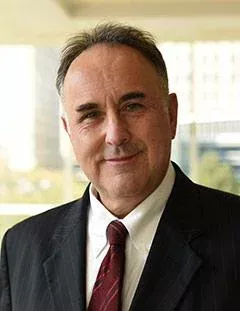
It has been fifty years since Justice Stewart made the convincing case for recognizing distinct, constitutional press freedoms. Yet, as it stands today, the Supreme Court is no closer to achieving it. If anything, based on the available empirical data, it is fair to say that the possibility of the Court recognizing the Press Clause as embodying distinct, constitutional press freedoms in the foreseeable future has notably decreased. To borrow from First Amendment scholars Sonja R. West and RonNell Anderson Jones, both of whom have studied the subject in great detail, in recent years there has been a “sweeping shift” in how the Court has framed the Press Clause, thus resulting in the “disappearance of the freedom of the press” from our public discourse.
The reasons given as to why the Press Clause continues to languish in obscurity, at least according to those who oppose recognizing distinct, constitutional press freedoms, which hereinafter this Article refers to as press freedom skeptics, are essentially three-fold. The first reason is that if the courts were ever to recognize any distinct, constitutional press freedoms it would ultimately create greater and unequal First Amendment protections for the press and news media versus the public at large. The second reason is that it is impossible for anyone to objectively determine who exactly should qualify as a member of the press or news media, and therefore should receive distinct, constitutional press freedoms. But undoubtedly the most intellectually influential reason given as to why the Press Clause continues to languish in constitutional obscurity is the third and last one — this reason being there is allegedly no evidence that historically shows the First Amendment was drafted, enacted, and ratified to embody constitutionally distinct press freedoms for persons engaged in the printing and newspaper business.
It is worth noting that all three of these reasons for denying distinct, constitutional press freedoms are quite old. All three have existed in our discourse going back to the 1930s — the very period when the Supreme Court began incorporating the First Amendment’s Press Clause through the Fourteenth Amendment’s Due Process Clause. However, as this Article will demonstrate, all three of these reasons are principally built upon two mistaken beliefs. The first mistaken belief is that the recognition of any distinct, constitutional press freedoms by the courts will ultimately negate or dilute the right of every citizen to write and publish freely on any and all subjects already protected under the umbrella of the First Amendment. This is demonstrably untrue. It is a fabricated Sophie’s choice. This brings us to the second mistaken belief regarding recognizing press freedom, which is intimately tied to first — the belief being that the Constitution somehow requires that we must choose between one of two historical interpretations of the Press Clause. There is purportedly no room for multiple historical interpretations. But this belief ignores the indisputable fact that history is rarely monolithic. Rather, history is both fluid and stagnant. What we mean by this is that although what happened in the past cannot change, the questions that historians ask of the past do, as does our general understanding of the past when new historical questions are asked and answered, and in the process new evidence is uncovered and laid bare.
This Article seeks to historically lay to rest the ill-conceived notion that the Press Clause was never intended to provide distinct constitutional protections to members of the press or the institutional press. In doing so, it takes the arguments of press freedom skeptics head-on. This Article is broken into three parts. Part I will outline the history-in-law case for why the historical record sufficiently supports recognizing distinct, constitutional press freedoms. Part II then provides a history-in-law response to some of the most common arguments made by press freedom skeptics as to why distinct, constitutional press freedoms should not be recognized by the courts. Lastly, Part III makes the case as to why the recognition of distinct, constitutional press freedoms should become a jurisprudential reality and provides a roadmap.
‘So to Speak’ podcast on anti-Semitism Awareness Act
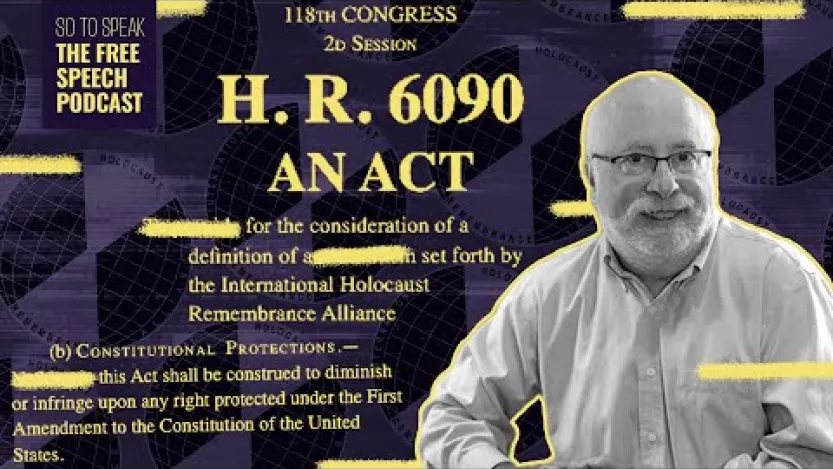
- “The Antisemitism Awareness Act,” “So to Speak,” FIRE (May 7)
On May 1, the U.S. House of Representatives passed the Antisemitism Awareness Act by a vote of 320 to 91. Proponents of the law say it is necessary to address anti-Semitic discrimination on college campuses. Opponents argue it threatens free speech.
Who’s right?
Kenneth Stern was the lead drafter of the definition of anti-Semitism used in the act. But he said the definition was never meant to punish speech. Rather, it was drafted to help data collectors write reports. Stern is the director of the Bard Center for the Study of Hate. His most recent book is titled, “The Conflict Over the Conflict: The Israel/Palestine Campus Debate.”
More in the news
- Eugene Volokh, “Can Nonprofits That Help Organize Protests Lose Their Tax Exemptions?” The Volokh Conspiracy (May 14)
- John R. Vile, “‘Catch and kill,’ Trump’s trial, journalism ethics and the First Amendment,” Free Speech Center (May 14)
- Eugene Volokh, “Excluding ‘FCANCER’ Personalized License Plate Violates First Amendment,” The Volokh Conspiracy (May 14)
- “US Appeals Court Says PA Town’s Limits on Political Lawn Signs Are Unconstitutional,” First Amendment Watch (May 13)
- Doha Madani and Rebecca Cohen, “Duke students walk out of Jerry Seinfeld’s commencement speech amid wave of graduation antiwar protests,” NBC News (May 12)
- “TikTok To Start Labeling AI-Generated Content as Technology Becomes More Universal,” First Amendment Watch (May 10)
- Jordan Howell and Talia Barnes, “Don’t turn commencement season into cancellation season,” FIRE (May 10)
- Jessica Wills, “MIT stops using DEI statements in faculty hiring,” FIRE (May 9)
2023-2024 SCOTUS term: Free expression and related cases
Cases Decided
- O’Connor-Ratcliff v. Garnier
- Speech First, Inc. v. Sands (certiorari granted, judgment re the bias policy claims vacated, and case remanded to the Court of Appeals for the 4th Circuit with instructions to dismiss those claims as moot) (Thomas and Alito, dissenting)
Review granted
- Vidal v. Elster (argued Nov. 1)
- O’Connor-Ratcliff v. Garnier (decided March 15, see below under “State Action”)
- Moody v. NetChoice, LLC and NetChoice, LLC v. Paxton (argued Feb. 26, 2024)
- National Rifle Association of America v. Vullo (argued March 18, 2024)
- Murthy v Missouri (argued March 18, 2024)
- Gonzalez v. Trevino (argued March 20, 2024)
Pending petitions
- No on E, San Franciscans Opposing the Affordable Care Housing Production Act, et al. v. Chiu
- Pierre v. Attorney Grievance Commission of Maryland
- O’Handley v. Weber
State action
- Lindke v. Freed (Barrett, J., 9-0: “The state-action doctrine requires Lindke to show that Freed (1) had actual authority to speak on behalf of the State on a particular matter, and (2) purported to exercise that authority in the relevant posts. To the extent that this test differs from the one applied by the Sixth Circuit, we vacate its judgment and remand the case for further proceedings consistent with this opinion.”)
- O’Connor-Ratcliff v. Garnier (Per Curiam: 9-0: “We granted certiorari in this case and in Lindke v. Freed (2024), to resolve a Circuit split about how to identify state action in the context of public officials using social media. Because the approach that the Ninth Circuit applied is different from the one we have elaborated in Lindke, we vacate the judgment below and remand the case to the Ninth Circuit for further proceedings consistent with our opinion in that case.”)
Review denied
- Mckesson v. Doe (Separate statement by Sotomayor, J.)
- Brokamp v. James
- Griffin v. HM Florida-ORL (application for stay denied)
- M. C. v. Indiana Department of Child Services
- Spectrum et al v. Wendler
- Porter v. Martinez
- Molina v. Book
- Porter v. Board of Trustees of North Carolina State University
- NetChoice, LLC v. Moody
- Alaska v. Alaska State Employees Association
- X Corp. v. Garland
- Tingley v. Ferguson (Justice Kavanaugh would grant the petition for a writ of certiorari. Justice Thomas, dissenting from the denial of certiorari. (separate opinion) Justice Alito, dissenting from the denial of certiorari. (separate opinion)
- Jarrett v. Service Employees International Union Local 503, et al
- Sharpe v. Winterville Police Dept.
- Winterville Police Department v. Sharpe
- Stein v. People for the Ethical Treatment of Animals, Inc., et al.
- Blankenship v. NBCUniversal, LLC
- Center for Medical Progress v. National Abortion Federation
- Frese v. Formella
- Mazo v. Way
Free speech related
- Miller v. United States (pending) (statutory interpretation of 18 U.S.C. § 1512(c) advocacy, lobbying and protest in connection with congressional proceedings) // See also Fischer v. United States (argued April 16)
Last FAN
FAN 422: “On resistance, revolution, and dissent — campus protests in 44 states and the District of Columbia”
This article is part of First Amendment News, an editorially independent publication edited by Ronald K. L. Collins and hosted by FIRE as part of our mission to educate the public about First Amendment issues. The opinions expressed are those of the article’s author(s) and may not reflect the opinions of FIRE or Mr. Collins.
Recent Articles
FIRE’s award-winning Newsdesk covers the free speech news you need to stay informed.
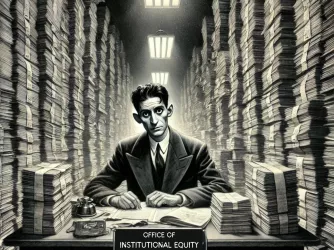
Navigating the Kafkaesque nightmare of Columbia's Office of Institutional Equity
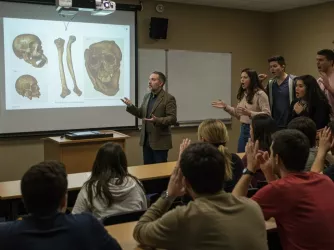
A picture is worth a thousand words — unless a college district bans it

Intimidating abridgments and political stunts — First Amendment News 461
